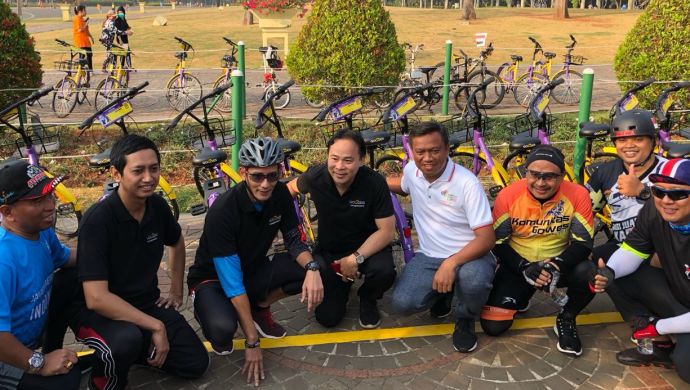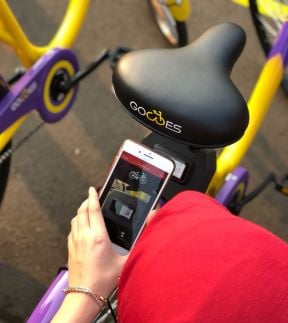GOWES is currently working with DKI Jakarta provincial government to test out its bike-sharing concept in Monumen Nasional area

PT Surya Teknologi Perkasa (GOWES) Director Iwan Suryaputra (fourth from left) with Deputy Governor of DKI Jakarta Sandiaga Uno (third from left) during the GOWES launch event
Compared to other markets in Asia Pacific such as China or Singapore, Indonesia is relatively behind when it comes to embracing the concept of bike-sharing.
There are are many factors that contributed to this. Toto Sugrito, Chairman and Co-Founder of Bike2Work Indonesia, even told The Guardian that Jakarta is a “dangerous” place for people to ride a bicycle.
Iwan Suryaputra, Director of PT Surya Teknologi Perkasa, which had recently launched bike-sharing service GOWES in Jakarta, agrees that generally Indonesia has no existing bike culture.
“Initially we thought Indonesians would only ride a bicycle if there is no other alternative left; for example, when they are taking a vacation in Bali … Everybody is taking either cars or motorbikes in Jakarta, and you know how hard it is for the government to convince people to take public transportation,” he explains to e27 in an interview.
“Still, there is nothing wrong in giving this a try,” he stresses.
GOWES was launched in the end of July under a partnership with the Provincial Government of DKI Jakarta. Currently undergoing trial stage, the bike-sharing service debuted by installing bicycles in seven points at Monumen Nasional (Monas) park in Central Jakarta.
The trial is expected to last for three months and will be continued with installments of stations in the area surrounding Monas and City Hall. In this next phase of trial, the GOWES stations will be integrated to TransJakarta bus stations in the area. The company is also in talks with building owners in the area to provide a designated parking lot for bicycles.
Prior to the trial in Jakarta, the service has already operated in several villages in Bali. GOWES is also reaching out to Semarang for a possible launch in the city.
Also Read: Are subsidies the key to occupying the bike-sharing market in China?
Guardians of the bicycles
There is one factor that sets GOWES service apart from the rest in Southeast Asia: Each station is being manned by one field staff from the company.
“People often commented, ‘Oh, what happened in China is going to happen here, where the bicycles are being thrown around’ … And we already began to see this happening to our bicycles. But what sets us apart from similar services in other countries is that we pay close attention to our bicycles. Every night we picked them all up and return them to their stations,” Suryaputra says.
Nearing midnight, once all the activities have ceased, GOWES team will scan the area for bicycles that are being left behind in random places. The team will then return it to the pick-up points so that the bicycles will be ready for use by the time morning comes.
“[Wouldn’t this be] inefficient? For the time being, we need to drop efficiency down the list because we want to educate the market to be disciplined [in parking their bicycles]. We will give them rewards such as free three-hour journey. Once we were able to successfully educate them, we will decrease the number of manpower on the ground,” Suryaputra explains.
“This takes time but we have the vision and the plan to make it happen,” he stresses.
Suryaputra says that GOWES is currently awaiting for the results of their trial in Monas, as it will determine the user acquisition strategy that the company is going to implement.
He describes how the bicycles are often fully occupied especially during weekends or afternoons.
“We are still trying to get an understanding of our users. Are they young people? The environmentally-minded? Or is it possible for us to reach out to all levels of the society?” he says.
“If 10 per cent of existing TransJakarta passengers would like to give the bicycles a try, it would already create a great impact,” he continues.
To attract users, GOWES tries to give them options. In addition to regular bicycles, they also provide electric bicycles and is planning to introduce electric scooters as well.
Also Read: I went on a 10km walk in Singapore yesterday and tweeted 27 bike-sharing encounters
Cycling ahead
GOWES is backed by Kresna Graha Investama and M Cash, one of the first two Indonesian startups to have listed on the Indonesia Stock Exchange (IDX).
The M Cash platform is one of the available payment options that GOWES provided for their users. Indonesia is widely known as a cash-dependent market, so the M Cash digital kiosk enables users to top-up by using cash.
“We are basically developing a bike-sharing service that has been adapted for the Indonesian market,” he adds.
PT Surya Teknologi Perkasa, the company behind the GOWES service, also owns an integrated digital map solutions.
It is set to launch a 3D map of Jakarta’s traffic in the near future; in fact, Suryaputra said that one of the reasons the company decided to enter the bike-sharing sector is to introduce its digital map service to the greater public.
“We are certainly are not able to compete with Google,” he laughs.
“So this is what we do to get people interested in our products,” he says.
GOWES itself is not the very first bike-sharing startup to have entered the market. The city of Bandung is home to Banopolis, which has tested its service on the campus ground of University of Indonesia in Depok. Singapore-based oBike has also previously announced its entry to Indonesia.
Though Suryaputra declined to comment on the company’s competition with oBike, he stated that it does not consider Banopolis as a competitor, due to the different nature of their target audience.
—
Image Credit: GOWES
The post How GOWES plan to introduce bike-sharing to the Indonesian market appeared first on e27.
